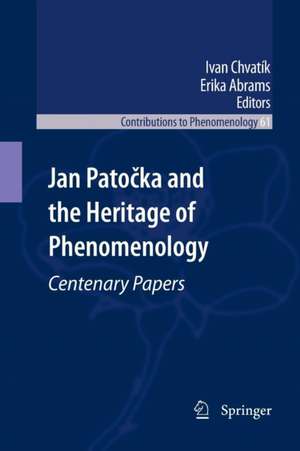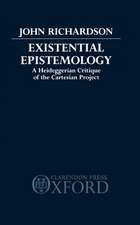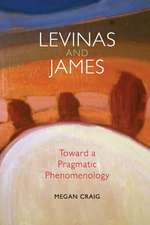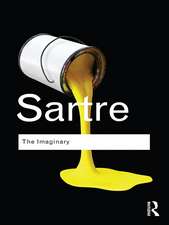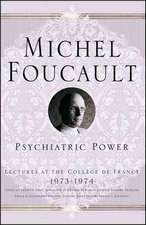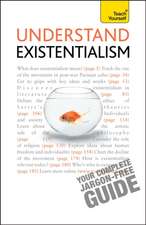Jan Patočka and the Heritage of Phenomenology: Centenary Papers: Contributions to Phenomenology, cartea 61
Editat de Erika Abrams, Ivan Chvatíken Limba Engleză Paperback – dec 2012
Scholars from around the world who are interested in the philosophy of Jan Patocka gathered in Prague to commemorate his centenary and the thirtieth anniversary of his death. The conference explored the significance of his work and its continuing influence on contemporary philosophy.
The volume presents selected papers from the conference in English language.
| Toate formatele și edițiile | Preț | Express |
|---|---|---|
| Paperback (1) | 641.38 lei 6-8 săpt. | |
| SPRINGER NETHERLANDS – dec 2012 | 641.38 lei 6-8 săpt. | |
| Hardback (1) | 647.59 lei 6-8 săpt. | |
| SPRINGER NETHERLANDS – 6 oct 2010 | 647.59 lei 6-8 săpt. |
Din seria Contributions to Phenomenology
- 20%
 Preț: 630.92 lei
Preț: 630.92 lei - 20%
 Preț: 693.49 lei
Preț: 693.49 lei - 18%
 Preț: 989.80 lei
Preț: 989.80 lei - 18%
 Preț: 1230.03 lei
Preț: 1230.03 lei - 15%
 Preț: 645.79 lei
Preț: 645.79 lei - 15%
 Preț: 657.39 lei
Preț: 657.39 lei - 18%
 Preț: 728.28 lei
Preț: 728.28 lei - 15%
 Preț: 635.96 lei
Preț: 635.96 lei - 15%
 Preț: 578.87 lei
Preț: 578.87 lei - 15%
 Preț: 638.43 lei
Preț: 638.43 lei - 15%
 Preț: 691.59 lei
Preț: 691.59 lei - 20%
 Preț: 505.32 lei
Preț: 505.32 lei - 15%
 Preț: 645.28 lei
Preț: 645.28 lei - 15%
 Preț: 637.28 lei
Preț: 637.28 lei - 18%
 Preț: 951.91 lei
Preț: 951.91 lei - 15%
 Preț: 634.00 lei
Preț: 634.00 lei - 15%
 Preț: 646.75 lei
Preț: 646.75 lei - 18%
 Preț: 727.97 lei
Preț: 727.97 lei - 15%
 Preț: 693.71 lei
Preț: 693.71 lei - 18%
 Preț: 729.06 lei
Preț: 729.06 lei - 15%
 Preț: 692.56 lei
Preț: 692.56 lei - 18%
 Preț: 778.94 lei
Preț: 778.94 lei - 18%
 Preț: 780.68 lei
Preț: 780.68 lei - 15%
 Preț: 646.62 lei
Preț: 646.62 lei - 18%
 Preț: 1231.47 lei
Preț: 1231.47 lei - 18%
 Preț: 730.35 lei
Preț: 730.35 lei - 18%
 Preț: 784.61 lei
Preț: 784.61 lei -
 Preț: 358.79 lei
Preț: 358.79 lei
Preț: 641.38 lei
Preț vechi: 754.56 lei
-15% Nou
Puncte Express: 962
Preț estimativ în valută:
122.74€ • 127.42$ • 102.35£
122.74€ • 127.42$ • 102.35£
Carte tipărită la comandă
Livrare economică 22 martie-05 aprilie
Preluare comenzi: 021 569.72.76
Specificații
ISBN-13: 9789400733640
ISBN-10: 940073364X
Pagini: 316
Ilustrații: XVI, 300 p.
Dimensiuni: 155 x 235 x 17 mm
Greutate: 0.45 kg
Ediția:2011
Editura: SPRINGER NETHERLANDS
Colecția Springer
Seria Contributions to Phenomenology
Locul publicării:Dordrecht, Netherlands
ISBN-10: 940073364X
Pagini: 316
Ilustrații: XVI, 300 p.
Dimensiuni: 155 x 235 x 17 mm
Greutate: 0.45 kg
Ediția:2011
Editura: SPRINGER NETHERLANDS
Colecția Springer
Seria Contributions to Phenomenology
Locul publicării:Dordrecht, Netherlands
Public țintă
ResearchCuprins
Ivan Chvatík, Preface; Václav Havel, Remembering Jan Patocka; Miroslav Petrícek, Jan Patocka: Phenomenological Philosophy Today; Petr Pithart, Questioning as a Prerequisite for a Meaningful Protest; Martin Palouš, Jan Patocka’s Socratic Message for the 21st Century; Marc Crepon, Fear, Courage, Anger: the Socratic Lesson; Josef Moural (Prague): Time and Responsibility, Kwok-ying Lau, Patocka’s Concept of Europe: an Intercultural Consideration; Steven Crowell, “Idealities of Nature”: Jan Patocka on Reflection and the Three Movements of Human Life, Eddo Evink, The Relevance of Patocka’s “Negative Platonism”; Burt Hopkins, Patocka’s Phenomenological Appropriation of Plato; Renaud Barbaras, Phenomenology and Henology; Tamás Ullmann, Negative Platonism and the Problem of Appearance; Pierre Rodrigo, Negative Platonism and Maximal Existence in the thought of Jan Patocka; Johann Arnason, Negative Platonism: Between the History of Philosophy and the Philosophy of History; James Mensch, Patocka and Artificial Intelligence; Domenico Jervolino, Reading Patocka, in search for a philosophy of translation; Ludger Hagedorn, Beyond Myth and Enlightenment; Marcia Schuback, Sacrifice and Salvation: Jan Patocka’s readings of Heidegger concerning the question of technique; Lubica Ucník, Patocka on Techno-Power and the Sacrificial Victim (Obet); James Dodd, The 20th Century as War
Recenzii
From the reviews:
“This book is a collection of twenty papers selected from the proceedings of an international conference held in Prague in April 2007 to commemorate the centenary of Jan Patočka’s birth. Its publication is particularly welcome. … this volume provides a very stimulating overview of Patočka’s work, and it will be of substantial value to anyone with a serious interest in phenomenology … . ” (Bryan Smyth, Philosophy in Review, Vol. XXXI (5), 2011)
“This book is a collection of twenty papers selected from the proceedings of an international conference held in Prague in April 2007 to commemorate the centenary of Jan Patočka’s birth. Its publication is particularly welcome. … this volume provides a very stimulating overview of Patočka’s work, and it will be of substantial value to anyone with a serious interest in phenomenology … . ” (Bryan Smyth, Philosophy in Review, Vol. XXXI (5), 2011)
Notă biografică
Ivan Chvatík finished his graduate study under the supervision of leading Czech philosopher Jan Patocka. After Patocka’s death in 1977, he became head of the clandestine Jan Patocka Archive, which now has become part of the Institute of Philosophy of the Academy of Science of the Czech Republic. In 1993, he became the co-director of the Center for Theoretical Study, an interdisciplinary institute for advanced study at Charles University and the Academy of Science. He became the editor of the first complete Czech translation of Martin Heidegger’s Being and Time (1996), and is currently in charge of editing Patocka’s Complete Works (twelve volumes published to date out of a planned twenty-five).
Textul de pe ultima copertă
Whereas for the wider public Jan Patočka is known mainly through the circumstances of his death in Prague, on March 13, 1977, after long interrogations by the Communist secret police, as a defender of human and civic rights in Czechoslovakia and one of the first spokespersons of the Charter 77 movement, the international philosophical community sees in him an important and inspiring thinker, who elaborated in an original way the great wellsprings and impulses of European thought – mainly Husserl’s phenomenology and Heidegger’s philosophy of existence. Patočka also reflected on the future of humanity in a globalized world and laid the foundations of an original philosophy of history. His work is a subject of lively philosophical discussion especially in French and German-speaking countries, but also, more recently, in the Hispanic world, North America and the Far East.
In April 2007 scholars interested in Patočka’s philosophy gathered in Prague from around the world to commemorate his centenary and the thirtieth anniversary of his death. The conference explored the significance of his work and its growing influence on contemporary philosophy.
This volume presents in English language selected papers from the centenary conference
In April 2007 scholars interested in Patočka’s philosophy gathered in Prague from around the world to commemorate his centenary and the thirtieth anniversary of his death. The conference explored the significance of his work and its growing influence on contemporary philosophy.
This volume presents in English language selected papers from the centenary conference
Caracteristici
Patocka’s high relevance confirmed by the leading phenomenologists Patocka’s constructive criticism of Husserl and Heidegger explained and accepted by the leading phenomenologists Jan Patocka – an unknown philosopher from behind the late "iron curtain" – is for the first time presented to broader audience by the leading contemporary phenomenologists
